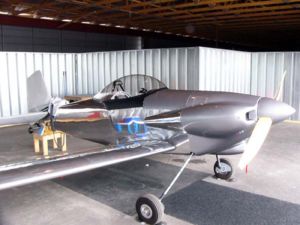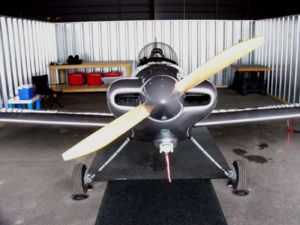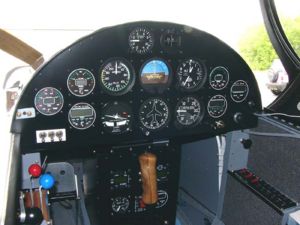PlaneSpottingWorld welcomes all new members! Please gives your ideas at the Terminal.
Van's Aircraft RV-3
The Van's RV-3 is a single-seat, single-engine, low-wing homebuilt airplane sold in kit form by Van's Aircraft.
Unlike many other aircraft in the RV line the RV-3 is only available as a tail-wheel equipped aircraft, although it is possible that some may have been completed by builders as nose-wheel versions. The RV-3 is the genesis design of the rest of the RV series, all which strongly resemble the RV-3. The RV-4 was originally developed as a two-seat RV-3.
Contents
Development
The architect of the line of Van’s aircraft, Richard VanGrunsven, designed the RV-3 in the late 1960s after experience flying the Stits Playboy amateur-built aircraft. The RV-3 started out as an attempt to maintain the Playboy’s layout and concept but to improve it in every regard. The RV-3 was designed to have light handling, aerobatic capabilities, fast cruise speeds and short field STOL capabilities. The RV-3 was also designed from the start for serious travel and as such carries 30 US gallons of fuel giving it a range of about 600 statute miles. The design horsepower is 100-150 typically using a Lycoming O-235 or Lycoming O-320 powerplant, although some builders have fitted RV-3s with more powerful engines.
The RV-3 uses a NACA 23015 airfoil on a constant chord wing. Construction is semi-monocoque of predominantly 2024-T3 aluminum sheet. The wings are built around an aluminum “I” beam spar with a lighter rear spar. The aircraft has simple flaps operated by a handle. The main landing gear is attached directly to the welded steel engine mount and consists of tapered, sprung steel tubes. Construction time for the RV-3 is reported to be 1300 hours for a first time builder.
The very first RV-3 built by VanGrunsven won “Best Aerodynamic Detailing” at the 1972 EAA Convention in Oshkosh in 1972.
Due to structural concerns the production of RV-3 kits was suspended in 1996. Continued customer demand for the single seat design resulted in VanGrunsven engineering a new wing for the RV-3. Production of kits was re-started a few years later. New aircraft completed since the wing redesign and aircraft that have been retrofitted with the new wing are referred to as an RV-3B. There is no RV-3A as in VanGrunsven’s designation system “A” models refer to nosewheel equipped versions.
Aircraft Type Club
The RV-3 and the rest of the RV series share a very active aircraft type club Van's Air Force that provides support for owners and pilots of all these aircraft.
Specifications (RV-3)
Performance for an RV-3 equipped with a Lycoming O-320 150 BHP and fixed pitch wooden propeller
General characteristics
- Crew: one pilot
- Capacity: no passengers
- Length: 19 ft 0 in (5.85 m)
- Wingspan: 19 ft 11in (6.12 m)
- Height: 5 ft 0 in (1.54 m)
- Wing area: 90 ft² (8.35 m²)
- Empty weight: 750 lb (340 kg)
- Loaded weight: 1,100 lb (498 kg)
- Max takeoff weight: 1,100lb (498kg)
- Powerplant: 1× Lycoming O-235 or Lycoming O-320 fixed pitch, 100-150hp (75-111 kW)
Performance
- Never exceed speed: mph (km/h)
- Maximum speed: 207 mph at sea level (335 km/h)
- Range: 595 statute miles at cruise 75% power at 8,000 ft (963 km at cruise 75% power at 2,500 m)
- Service ceiling: 23,500 ft (7200 m)
- Rate of climb: 2,050 ft/min (10.5 m/s)
- Wing loading: 12.2 lb/ft² (61 kg/m²)
Related content
Related development
Similar aircraft
Designation series
RV-3 - RV-4 - RV-6 - RV-7 - RV-8 - RV-9 - RV-10 - RV-11 - RV-12
External links
References
- Van's Aircraft Website
- Armstrong, Kenneth, Choosing Your Homebuilt – The One You’ll Finish And Fly, Butterfield Press, Templeton CA 1993.
- Bowers, Peter M, Guide to Homebuilts 9th Edition, TAB Books Blue Ridge Summit PA, 1984.
- Plane and Pilot, 1978 Aircraft Directory, Werner and Werner, Santa Monica CA 1978
Lists relating to aviation | |
|---|---|
| General | Timeline of aviation · Aircraft · Aircraft manufacturers · Aircraft engines · Aircraft engine manufacturers · Airports · Airlines |
| Military | Air forces · Aircraft weapons · Missiles · Unmanned aerial vehicles (UAVs) · Experimental aircraft |
| Notable incidents and accidents | Military aviation · Airliners · General aviation · Famous aviation-related deaths |
| Records | Flight airspeed record · Flight distance record · Flight altitude record · Flight endurance record · Most produced aircraft |



